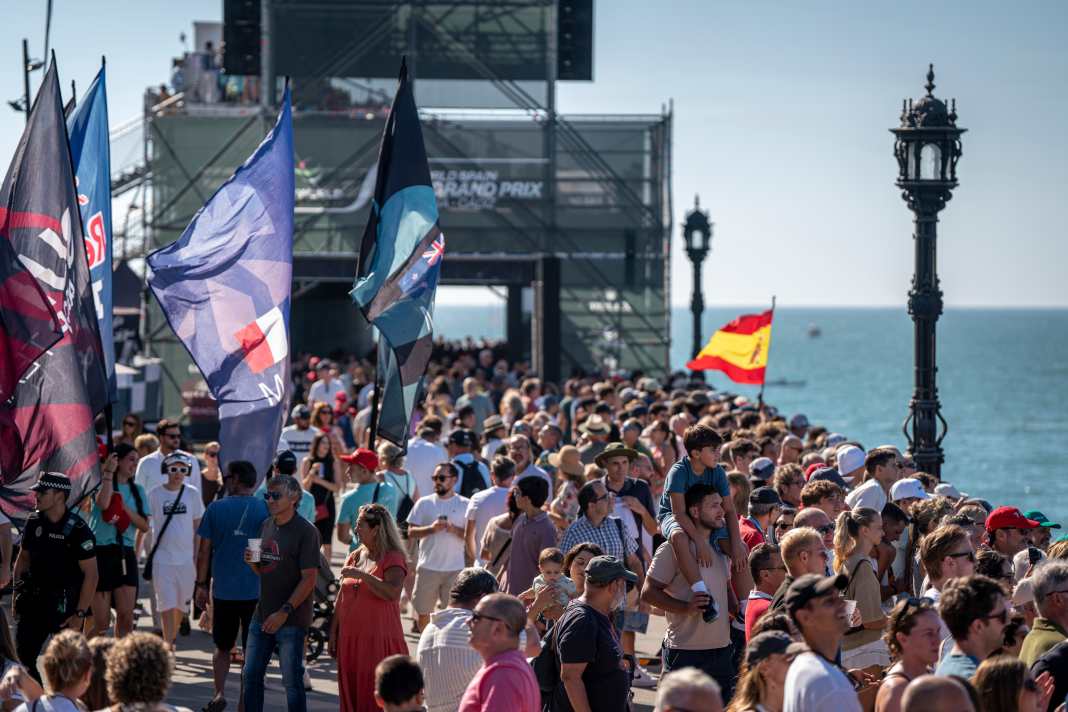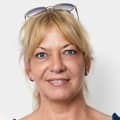





The first of the two days of racing at the DP World Spain Sail Grand Prix in Cádiz was full of surprises. The top three teams in the league from Australia, Great Britain and New Zealand as well as the fourth-placed Spanish team had big plans for the penultimate event of the fifth SailGP season. For them, it's all about the best starting positions for the grand finale at the end of November in Abu Dhabi, where only the top three teams reach the two-million-dollar showdown.
Opening bumper for the favourites
In the very first Cádiz race, however, the Australian leaders of the Bonds Flying Roos were unable to finish higher than ninth. The New Zealand league runners-up only reached the finish line in eleventh place. And the Spaniards, for whom so much is at stake in their home game as fourth in the standings, finished last.
While the New Zealanders and the Spaniards recovered with second and third places in race two, Tom Slingsby's Australians suffered another poor result in eleventh place before salvaging the day with a race win and fifth place overall after four races. The team of the day were the Danes, who remained inconspicuous in eighth place in the first race, but then went from strength to strength with two race wins and a second place.
Nicolai Sehsted and his Rockwool Racing team led the Cadiz classification on Saturday evening with 32 points, one point ahead of Team Emirates GBR (31 points). Peter Burling's Black Foils (22 points) followed at a considerable distance. The Germany SailGP Team also impressed once again on Saturday. Helmsman Erik Kosegarten-Heil made strong starts in which he repeatedly looked for - and found - the gap with good timing. "The starts were epic today, but I have the feeling that we still have plenty of construction sites on the course," he said after the races.
Next chance for the Germany SailGP Team in the final
In a light wind foursome, Erik Kosegarten-Heil, Stuart Bithell, James Wierzbowski and Anna Barth sailed the big wings to 4th, 4th and 3rd place, with Black-Red-Gold only dropping out of the top three in the fourth race after a series of penalties. However, the German racing team will start from fourth place, tied with the Kiwis on 22 points, with every chance of making it to another final in the Cádiz deciders on Sunday. Click here for the intermediate results after the four races on Saturday.
Commenting on the penalties in Saturday's fourth race, strategist Anna Barth, who was called upon to grind and trim the headsail, said in an interview with ZDF: "I think we actually had the best starts in the fleet throughout the day. Which also always positions you well for the rest of the way, around the first buoy... We got off to a really good start in the last race. Then we had the French in the boundary - and actually it's still questionable whether that was really a penalty."
Anna Barth's interpretation: "We actually started manoeuvring in front of them and, in my opinion, left enough space. But in the end (editor's note: in the eyes of the referees) it was because we didn't give them enough space to avoid the boundary and didn't manoeuvre fast enough. Then we just had to drop back behind them. But they fell off the foils. And that was the knockout for us, it was very tough."
The different effects of SailGP penalties
Why did the penalties that the Germany SailGP Team had already taken in the previous races carry less weight than those in the last race? Anna Barth explained: "We had already had penalties in two previous races. Because we didn't avoid a boat to leeward of us. But they came out in front of us after the gybe. The penalty was gone straight away. It was completely different with the French. That cost us the race."
Erik Kosegarten-Heil later described his almost desperate efforts to fall behind the Frenchmen who had fallen off the foils in accordance with the penalty regulations. "We were always going back and forth, back and forth. It was really painful."
If we had finished the race well, we would now be first on the leaderboard." Anna Barth
However, because the first three races had gone so well, the setback of twelfth and last place in the fourth race did not have any dramatic consequences. "So now we're sitting in fourth place. That's pretty good too. We are very happy," Anna Barth concluded her flash analysis.
The Hamburg native, who lives in Kiel, also put the successful first three races down to the confident starts: "I think the starts were definitely a key. We even gave something away once or twice in the first gybe... We're sailing on the open Atlantic here. A bit of swell comes in here. The manoeuvres and especially the foiling manoeuvres are quite difficult."
The challenges of the Atlantic wave
Two foiling tacks close to the windless city walls had not gone well for Team Germany in previous races. "Especially at the lower leeward buoy, when you went round to the right, you were heading towards the city walls. There was always relatively little wind there. A foiling turn was quite difficult there. We didn't manage that twice. And that cost us a few places..."
Anna Barth points out the differences: "It's more difficult to fly the boat consistently in the wave. It's not as easy as keeping the boat nice and straight in the air in very flat water. And that's what we need to be as fast as possible," said the trained 49erFX helmswoman during the live broadcast on ZDF. The formula is simple: "The less of the boat is in the water, the faster we go. It's more difficult to manage with the waves."
Overall, the team "managed the challenges on the first day of the Cádiz SailGP very well", said Anna Barth. You can also see that in the results. Sailing demanded a lot from her on this day of flat winds: "It was really exhausting today. But I also really enjoy the role at the front during the grind. I also trim the headsail. That takes up a lot of my capacity. It's a different role. I'm no longer so strategically involved, but physically and technically, as far as the boat is concerned."
The German motto for Sunday: "All in!"
The conclusion of Kiel SailGP grinder Jonathan Knottnerus-Meyer went even further: "We showed in Geneva that we can be pretty good in these light conditions. Today we confirm that and hope that we can continue to do so." Anna Barth also gave the motto for Sunday: "All in!"
Transfers on the SailGP market were and remain another topic in Cádiz. Here, the personnel merry-go-round is turning ever faster. "It's also due to the fact that we often still have one-year contracts at the moment," said Jonathan Knottnerus-Meyer in an interview with Alexander Ruda.
Grinder, who has been sailing for Team Germany for two years now, continued: "But I think that will change by the end of the season at the latest, because the team bosses will also realise, oh, the people are gone if they only have a one-year contract and are then bought away by another team..." Longer-term contracts can counteract this increasingly common phenomenon.
Old acquaintances in new team colours
According to Jonathan Knottnerus-Meyer, this means that the SailGP will "definitely develop in a very professional direction". According to the Kieler, there are also impressively "higher sums" involved. This certainly also applies to the new Swedish team Artemis, with whom Nathan Outteridge is making his comeback in Season six will tackle. The new season will begin with the Orcale Perth Sail Grand Prix on 17 and 18 January. Many of the teams will then feature old acquaintances in new colours.
From Danish magic to British risk minimisation to "epic starts" by the Germans - the reactions of the helmsmen after the first four Cadiz races on Saturday evening:
REPLAY! The first of the two race days at the DP World Spain Sail Grand Prix in Cádiz in the replay:

Tatjana Pokorny
Sports reporter

